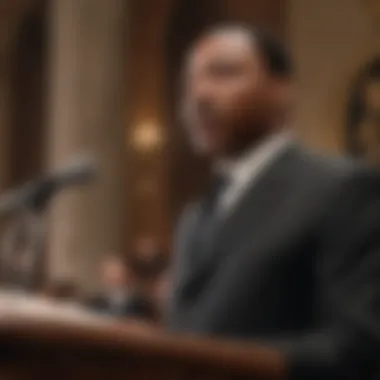Exploring Martin Luther King Jr.'s Enduring Legacy


Intro
Martin Luther King Jr. is more than a name in history; he is a symbol of hope and justice. This article aims to unpack his life and work, showing how his voice shaped a movement. King believed profoundly in equality, and his efforts made significant changes in America and beyond. Understanding his legacy is crucial for young minds today, as it inspires a commitment to social justice.
Throughout this article, we will examine crucial details of his childhood, his notable achievements, and the obstacles he faced. Also, we will discuss why his ideas still resonate in contemporary conversations about civil rights. Reading to this end empowers future generations to uphold the values of justice and equality.
Nature Topic Overview
Even though Martin Luther King Jr.'s work might not seem naturally related, his legacy implicitly teaches about communal harmony. King believed in unity and the importance of community. When society works together harmoniously, it forms a vibrant living system, comparable, in some ways, to nature. Understanding his ideals invites us to consider how people relate to each other, similar to how species coexist within the universal ecosystem.
The Important Values of King’s Legacy
- Equality: King fought tirelessly for the civil rights of African Americans so every person might be treated equally.
- Nonviolence: He strongly preferred using peaceful methods to bring change, teaching the world to pursue justice without harm.
- Hope and dreams: His famous
Preface to Martin Luther King Jr.
Understanding Martin Luther King Jr. is critical for grasping the civil rights movement's unique context and implications. King was not just a leader; he embodied a philosophy of action spoonfed to a nation grappling with division and hatred. The importance of this segment to the article lies in his identity and approaches that laid groundwork for a movement focused on equity, activism, and love.
Who Was Martin Luther King Jr.
?
Martin Luther King Jr. was born on January 15, 1929, in Atlanta, Georgia. He was the son of a Baptist minister; this upbringing greatly influenced his character and commitment to social justice. King pursued higher education, obtaining a doctorate in theology from Boston University. He encouraged nonviolent protest against social injustices during his time. King's most notable role was as a civil rights leader advocating equality for African Americans, employing methods inspired by Gandhi's teachings.
He became well-known for his eloquent speeches and vigorous activism in the movement against racial segregation. King's efforts led to critical legislative changes and mobilized masses during the turbulent times of the 1960s.
Importance of His Legacy
Black Americans experienced perilous conditions during King's lifetime, facing grievous injustices and condemnation. The legacy King left behind goes beyond individual achievements or singular movements. It tackles universal themes fumdamental to humankind, such as justice, dignity, and equality.
“Injustice anywhere is a threat to justice everywhere.” This significant quote encapsulates the essence of King's message—showing that fairness must be championed at all levels.
Sophisticated elements continue intertwined in King's legacy include:
- Nonviolent Resistance: hand-in-hand with dignity, his strategy of nonviolent resistance has inspired countless movements, revealing peaceful approaches possible within conflict.
- Continuous Relevance: Kin's thoughts circulate within modern discussions on social justice, offering valuable perspectives that resonate today. Many movements adopt his philosophy while fighting further instances of inequality.
King's persistent call for social change remains a source of strength for activists tackling injustices today. Through education and reflection on his life, one understands King's impact and engages with ongoing struggles for equality.
Early Life of Martin Luther King Jr.
Understanding the early life of Martin Luther King Jr. is critical to appreciate his trole as a leader and his process for developing his vision of justice and equality. His formative years shaped his beliefs and values, which later greatly influenced the civil rights movement. Through an exploration of King's family background and education, one can gain insight into the character and ideology that propelled him to become a remarkable figure in American history.
Family Background
Martin Luther King Jr. was born on January 15, 1929, in Atlanta, Georgia, to a family with strong ties to the church. His father, Martin Luther King Sr., was a prominent pastor. His mother, Alberta Williams King, also played significant roles in church and community activities. Growing up in an environment where moral values and social issues were discussed regularly laid the basis for King's perspectives on equality and justice.
King's family was deeply affected by racism, a common experience for African Americans in the South during that time. For example, his family's experiences with discrimination and segregation helped formulate his understanding of injustice early on. The lessons learned within the household continuous to resonate throughout his activism. In this context, King learned tools such as empathy, compassion, and a strong moral compass. They were vital not only in his personal life but also in shaping his public persona.
Education and Early Influences
Education played a crucial role in the life of Martin Luther King Jr. He attended Atlanta public schools and later enrolled at Morehouse College, where he earned a Bachelor of Arts in Sociology. This education improved his critical thinking and peprared him well for the challenges he would face in the future.
In his time at Morehouse, King was influenced by impactful figures such as Benjamin Mays, who became a mentor to him. Mays's teachings about morality and commitment to social responsibility very much shaped King's own beliefs. During this critical educational phase, King was exposed to a broader worldview, deepening his understanding of systemic racism.
Additionally, King's education was not confined to formal institutions. He was inspired by the works of Mohandas Gandhi and other pacifists. Their ideologies showed the effectiveness of nonviolent resistance. This eventually became a fundamental aspect of King's civil rights strategy Later, King pursued a Doctor of Philosophy in Systematic Theology at Boston University. These diverse educational experiences steadily equipped him with insights and understanding of the world—a true foundation for his dedication to justice and equality.


The Civil Rights Movement
The Civil Rights Movement was a pivotal chapter in American history. It brought to the forefront issues relating to race, equality, and social justice. Martin Luther King Jr. played a significant role in this movement, championing the cause for peaceful protests and advocating for systemic change. Understanding the scope of this movement is crucial, as it showcases how collective action can influence laws and societal norms.
Key Events and Milestones
This section is essential for grasping the timeline of civil rights advancements. Several key events helped shape the movement's trajectory.
- Brown v. Board of Education (1954): This landmark ruling declared that racial segregation in public schools was unconstitutional. It set the stage for desegregation efforts elsewhere.
- Montgomery Bus Boycott (1955-1956): Sparked by Rosa Parks' refusal to give her bus seat to a white passenger, this event was a significant act of defiance. King emerged as a leader during this boycott, enhancing his profile in the civil rights community.
- March on Washington (1963): Perhaps the most iconic event of the movement, this march drew massive crowds. King delivered his famous “I Have a Dream” speech here, which advocated for racial harmony.
- Civil Rights Act (1964): This legislation prohibited discrimination based on race, color, religion, sex, or national origin, marking a major victory for the movement.
- Voting Rights Act (1965): This act aimed to eliminate barriers preventing African Americans from voting, further promoting equality.
These events collectively highlight the natural progression of the movement, representing the fight for justice and recognition.
Role of Nonviolent Protest
Martin Luther King Jr. firmly believed in nonviolence as the best way to enact social change. He attended many workshops on nonviolent methods and drew inspiration from figures like Mahatma Gandhi. King's approach emphasized dialogue over violence and aimed to appeal to the moral conscience of a nation.
- Moral Authority: Nonviolent protests often unmasked the moral failures of segregationists. Visuals of peaceful demonstrators facing aggression swayed public opinion.
- Broad Participation: King's methods allowed individuals from various backgrounds to join the cause. It galvanized a wider coalition, including white allies.
- Global Impact: By advocating nonviolent resistance, King also emphasized that this method could be applied in various contexts worldwide, inspiring movements beyond the United States.
Nonviolent protest emphasized dignity and respect in the pursuit of equality.
The Civil Rights Movement's lessons remain relevant today. Martin Luther King's legacy continues to inspire those fighting for justice and equality. His belief in nonviolence proves that substantial change is achievable without splitting safety and morality.
Major Speeches and Writings
Martin Luther King Jr. is most recognized for his powerful speeches and writing. They played a key role in igniting motivation and commitment during the Civil Rights Movement. These works continue to resonate globally, reminding us of the fight for justice and equality. Through clear and impactful language, King addressed complex issues, inspiring many across generations.
His writings represent not only his ideals but also tactical approaches to activism. The way he articulated the struggle against racial inequality is remarkable. By examining King's speeches and letters, one sees his thoughts refined during intense moments of pressure. Each piece displays his ability to connect with people's emotions and sense of justice.
Have a Dream Speech
King delivered his I Have a Dream speech on August 28, 1963, during the March on Washington for Jobs and Freedom. This marked a pinnacle moment in the Civil Rights Movement. The speech evoked a sense of hope and urgency for equality. Early lines outline the struggle faced by African Americans while emphasizing the need for legislative change and reconciliation.
Key elements to highlight include:
- Vision for Equality: King stated his dream of a future where individuals are judged by their character, not skin color. This universal understanding of justice remains significant today.
- Emotional Appeal: Almost everyone can find a personal connection with the dreams King outlined. Phrases invoking personal experiences resonate deeply with listeners, keeping them engaged and active.
- Cultural Significance: King's use of rhythm and repetition created a musical quality that remains compelling. The phrase, “I have a dream,” invites the audience to join him and invest emotionally in the cause.
“I have a dream that one day this nation will rise up and live out the true meaning of its creed.”
This part of the speech powerfully articulates national aspirations wherein dignity is guaranteed to all citizens. Its delivery combined with historical context lifted the aspirations that redefined America.
Letters from Birmingham Jail
In 1963, while imprisoned for participating in civil rights demonstrations, King penned Letters from Birmingham Jail. The letter has since become a critical part of the dialogue on injustice in America. It explained the rationale for civil disobedience, drawing strong distinctions between just and unjust laws.
Consider the points that strengthen the letter:
- Moral Responsibility: King argued that individuals have a moral duty to disobey unjust laws as a form of resistance. It established a framework for understanding civil action against systemic issues.
- Interconnectedness: He expressed the reality that
Challenges and Opposition
Personal and Professional Struggles
Martin Luther King Jr. faced numerous personal and professional challenges throughout his life. His steadfast commitment to civil rights often put him in precarious situations. He dealt with constant scrutiny from government agencies and critics of the movement. His resilience was tested by distressing events, such as the bombings of his home and threats against his family. These threats did not just aim at him, but also on his wife, Coretta Scott King, and their children. The pressure was intense, evident through frequent bouts of anxiety and hardship in their personal lives.
Moreover, King's dedication sometimes came at the cost of peace at home. While he strived for change in society, he struggled to provide enough time and emotional support to his family. Personal sacrifices were glaring as he continued to travel extensively for the movement, tirelessly chasing justice. These issues reflected the broader struggles of many leaders of social movements, highlighting the intersections of public duty and private life.


His struggle was not only external but internal as well. King grappled with doubt and fear. For instance, he once admitted in his letters about losing hope and feeling despair amid the persistent injustices. This common battle among civil rights leaders reminds us that even the most prominent figures wrestled with their vulnerability.
Government and Public Opposition
The struggle against governmental and public opposition shaped much of King's activism. Government agencies often viewed him as a threat. The Federal Bureau of Investigation, under J. Edgar Hoover, closely monitored his activities. Hoover classified King as a potential communists. This surveillance created an atmosphere of profound mistrust. Additionally, King endured constant attempts to discredit him through rumors and false accusations, aiming to undermine his leadership.
Public opinion was also crucial during King’s lifetime. Different factions opposed his focus on nonviolent protest. Some believed violence was necessary for effecting change, leading to polarization in the movement itself. King confronted not only racial intolerance but also pushback from segments within the black community that critiqued his methods.
Importantly, this opposition tested the resolve of the civil rights movement. It exposed fissures in public unity on the path toward justice. Yet, it also solidified King's position within the movement. His ability to maintain a nonviolent approach won the support of diverse groups, aligning protests with moral imperatives.
Ultimately, these challenges fostered a deepened commitment to his values. The oppression faced became a rallying cry for strength, empowering both King and those who followed.
King’s capacity to confront adversity illustrated the powerful legacy he left behind. His experiences serve to highlight the ongoing struggles seen today, warranting reflection into approaches within social justice movements. Despite the overwhelming challenges, King's optimism and great drive forged a path battling preconceived barriers, inspiring others to continue his work.
King's Assassination and Its Aftermath
Martin Luther King Jr.'s assassination on April 4, 1968, was not just a tragic event but also a pivotal moment in American history. King's death sparked an intense wave of reactions across the country. It was a profound shock that divided communities, disrupted families, and altered the course of the civil rights movement. Understanding this context is crucial as it reveals the complexity surrounding King’s legacy and the profound impact he had on a society striving for equality.
Events Leading to His Death
In early 1968, King shifted focus to pressing social issues like poverty and economic justice, culminating in plans for the Poor People's Campaign. He was in Memphis, Tennessee, supporting a strike by sanitation workers fighting for better wages and working conditions. This marked a new direction for King's activism, pushing for broader justice beyond civil rights.
As the situation elevated in Memphis, threat levels against him also heightened. King received numerous death threats, yet he remained undeterred. On the evening of April 4, he stood on the balcony of the Lorraine Motel. It was in this moment that an assassin's bullet ended his life, tragically silencing one of the foremost advocates for nonviolent resistance and social change.
Public Reaction and Mourning
The news of King’s death ignited a visceral reaction across different sectors of society. Violence erupted in several cities, and there were numerous reports of rioting and looting. Yet, alongside this turmoil, many gathered to mourn his loss. Vigils were held, and people laid flowers at places significant to King’s journey, illuminating the widespread respect and admiration they held for his work.
“King’s death made me realize the assassin couldn't silence his work.” - A reflective sentiment often shared among mourners.
Various public figures spoke out during this time, emphasizing the need for continued commitment to King’s vision. For numerous leaders and ordinary citizens alike, the feelings of despair quickly morphed into fervent resolve to honor his memory through activism.
Influence on Future Movements
King's assassination left a profound legacy that would influence numerous social movements across the globe. His emphasis on nonviolence and civil disobedience became frameworks for groups advocating for social change. For instance:
- The LGBTQ+ Rights Movement drew inspiration from King’s fight for justice.
- Organizations supporting women's rights echoed his calls for equality.
- Modern Black Lives Matter movements trace their roots back to the philosophies espoused by King.
In this way, King’s death became a rallying point. The principles he taught stemmed their relevance in times when communities faced significant injustice. His works and speeches acted as guiding principles, reminding future generations that the quest for equality requires unity, persistence, and courage.
Through each of these sections, we can appreciate how significant King's assassination was—not just in closing a remarkable chapter in the American fight for civil rights, but also in igniting continued movements that work to fulfill his dream of equality for all.
The Enduring Impact of King’s Work
Martin Luther King Jr.'s contributions extend far beyond his lifetime. His vision of equality and justice continues to influence contemporary society. In examining King's legacy, it becomes clear that his ideas remain crucial in addressing the challenges of today. Understanding how his philosophies have shaped modern activism provides a framework for today's struggles for social justice.
Influence on Modern Civil Rights Activism
King’s influence on current civil rights movements cannot be overlooked. Activists today frequently draw from his methods and philosophies. Leaders in movements such as Black Lives Matter emphasize nonviolent protest, a hallmark of King’s approach. This strategy is effective in promoting dialogue and transformation, while often minimizing conflict. The structures King built in his time promote unity.
Furthermore, organizations working against social inequities today echo King’s core messages about justice. They advocate for a society where every individual retains equal protection and rights. Young activists learn about King’s approach through education and personal experiences. This personal connection fosters a strong sense of commitment to family, community, and nation. Echoing King’s vision encourages deeper involvement in local initiatives and campaigns that confront fights against disparities.
King’s methods can also be observed in various campaigns striving for equality today, such as those tackling systemic racism, voter suppression, and economic injustice. He inspires a call for social responsibility across various platforms and utilizes technology to mobilize individuals. Understanding this connection is crucial for future leaders as it highlights the ongoing fight for civil rights and the importance of civic engagement.
King's Philosophy in Today’s Social Justice Movements


The principles of nonviolence and love that characterized King’s work remain pivotal in ongoing social justice efforts. Activists today often embrace his belief that achieving justice requires persistent and peaceful efforts within the conflict. King urged for dialogue, compassion, and support instead of anger.
This philosophy surfaces in various areas, from community organizing to larger-scale movements. For instance, young people now regularly engage in conversations about race and equity through social media platforms. They share personal stories and use King’s teachings to frame injustices. This connection creates not just leaders but empathetic individuals aware of the impacts of these issues.
Key aspects of King’s philosophy also contribute to understanding intersectionality, a vital focus in modern activism. Recognizing how different systems of oppression interact reflects the complexity of community challenges today. King encouraged activists to struggle against all forms of injustice simultaneously.
“Injustice anywhere is a threat to justice everywhere.”
— Martin Luther King Jr.
Parents who educate their children about King's principles foster ingrained understandings of equity, respect, and rights. When these values are passed along, younger generations can form foundational beliefs on what life should entail, fostering better leaders for tomorrow. It is essential to continue showcasing King's philosophies so that his work persists as an active force shaping our society.
Educational Resources for Young Learners
Educational resources on Martin Luther King Jr. are vital for fostering understanding about civil rights and social justice among young learners. These tools help children grasp historical concepts and relate them to current events. Engaging with King's legacy is essential for nurturing informed citizens who value equality and respect for all.
Access to diverse materials allows educators and parents to appeal to different learning styles. Reading, watching documentaries, or discussing ideas breaks down complex themes into understandable segments. These activities also promote critical thinking as children compare past actions to current situations.
Books about Martin Luther King Jr.
Books on Martin Luther King Jr. can serves as a key resource to engage young readers with his life and ideals. They introduce important concepts in accessible language. Here are several recommended titles for various age groups:
- Martin’s Big Words by Doreen Rappaport
- Who Was Martin Luther King, Jr.? by Bonnie Bader
- My First Book of Peace by Ann F. Rocks
These books offer storytelling that enriches empathy and provides context about the struggle for civil rights.
Other key benefits of reading books include:
- Increased comprehension of civil rights topics
- Inspirations drawn from King's life for personal growth
- Discussion starters for parents and children to explore important ideas together
Documentaries and Films
Documentaries and films represent another dynamic way to introduce young audiences to Martin Luther King Jr.'s legacy. They fuse visual storytelling with real-life historical events, creating engaging educational experiences. Noteworthy films include:
- Eyes on the Prize
- Selma
- The March
By watching these educational films, children can visualize the social tensions of King's era. This enhances their understanding and emotional connection to the civil rights movement.
Film viewing comes with a range of benefits and considerations:
- Visual Learning: Provides a vivid portrayal of historical events.
- Impactful Narration: Captivates and retains learners’ attention.
- Discussion Opportunities: Opens up conversations with educators and guardians about mistakes of the past and pathways forward.
Understanding the importance of the civil rights movement starts young. Resources like books and films illuminates the path to nurturing socially responsible future citizens.
Choosing the right content is crucial for effective learning. As we educate future generations, we should focus on thoughtfully curated resources, promoting critical discourse around Martin Luther King Jr.'s philosophies. The combination of reading and watching fosters an environment ripe for growth and education about justice and equality.
Finale
The reflections on Martin Luther King Jr.'s legacy serve as emphatic reminders of the principles and values he embodied. His work and teachings provide crucial insights into understanding social justice today. King’s methods and beliefs remain relevant and significant for modern social movements. In examining his legacy, individuals can confront current injustices while fostering a commitment to equality.
Reflections on Legacy and Future Generations
King’s legacy, grounded in nonviolent resistance and a pursuit of justice, shapes discussions on civil rights each day.
The Importance of Understanding His Legacy:
- Awareness: Knowing King’s contributions allows for betterment of societal understanding about equality and fairness.
- Education: Informed young minds lead to discussions on values of acceptance and justice.
- Support: King’s philosophies encourage nurturing future leaders who seek to challenge injustice.
Martin Luther King Jr. illustrates the power of dreams. Through his perseverance, he has inspired movements that expanded rights. Young learners can witness how his life informs activism and shapes their responsibilities today.
While the past is critical, teaching upcoming generations ensures a continued push for equity. King’s work advocates for a world where all are treated going forward.
By fostering these dialogues, ultimately when we reflect on Martin Luther King Jr.'s contributions, we must look towards the future. The cycle of education and inspiration is endless, ensuring that King's message resonates completely with those who stand for equality.







